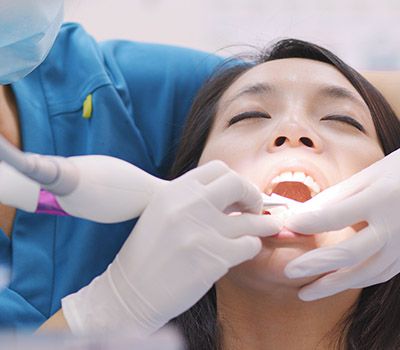TMJ Disorder
Do you often find it difficult to bite and chew food due to persistent pain near the jaw joint? Or, do you hear a popping or clicking sound when you move your jaw? These are some of the many symptoms of Temporomandibular Joint Disorder (TMD), which is an oral condition affecting the tissues surrounding the TMJ. Getting the condition treated at the earliest is essential to avoid severe symptoms in the future.
What causes TMD?
- In most cases, TMD is caused due to excessive pressure applied to the tissues around the joint. This could happen due to frequent snacking, chewing gum, clenching the jaw, grinding the teeth, etc.
- External trauma to the face, especially the TMJ or the lower jaw, could also give rise to TMD.
- Bruxism is a sleep-related condition where the patient subconsciously grinds one's teeth while asleep. This could apply unwanted forces on the TMJ and surrounding tissues.
- Sleep apnea, a sleep-related condition, often co-occurs with bruxism as well.
- Several types of arthritis can affect the TMJ including osteoarthritis, rheumatoid arthritis, and secondary degenerative arthritis.
What are its symptoms?
- Pain in the jaw or TMJ while biting and chewing food, talking, yawning, laughing, etc.
- Persistent headache, especially after waking up
- Lockjaw
- Inability to close jaw
- Limited movement of the lower jaw
- Popping or clicking sound when you move the jaw
- Pain, sensitivity, or tenderness of the masseter or temporalis muscles
- Ringing sound in the ear
- Swelling near the TMJ
How can the condition be treated?
Massaging the TMJ every now and again helps to relieve the tissues of the stress. This also loosens them and makes it easier for you to move the jaw when you bite and chew food, talk, etc. Along with this, you can make subtle changes to your routine to get significant relief from TMD. Some of them are avoiding frequent snacking or chewing gum, clenching the jaw either consciously or subconsciously, holding the phone between the head and shoulder while on a call, sleeping in awkward positions, etc.
When you visit the dentist, a thorough diagnosis will be conducted, after which the dentist will suggest suitable treatment. At Dr. Fay Hu's Family Dentistry, we exclusively practice non-invasive treatment, which includes but is not limited to, occlusal adjustments, Botox, andprecision occlusal appliances.
How can malocclusion be treated?
Malocclusion not only messes up your smile but also leads to the accumulation of microbes on the teeth and affects the functionality of the mouth. Although it is best to get the condition treated when the patient is young, we recommend you visit the dentist and get it diagnosed as early as possible. The conventional means of getting malocclusion treated is using dental braces. But, if you prefer a more aesthetically pleasing option, we recommend clear braces or Invisalign.
Please get in touch with us through online consultation or by calling us at 407-647-3223, and we'll guide you further.
Visit Our Office
Winter Park, FL
Fay Hu General Dentistry 800 West Morse Blvd Suite 3B, Winter Park, FL 32789
Email: [email protected]
Book NowOffice Hours
- Monday8:00 am - 5:00 pm
- Tuesday7:00 am - 2:00 pm
- Wednesday8:00 am - 5:00 pm
- Thursday7:00 am - 2:00 pm
- FridayBy appointments only.
- SaturdayClosed
- SundayClosed






